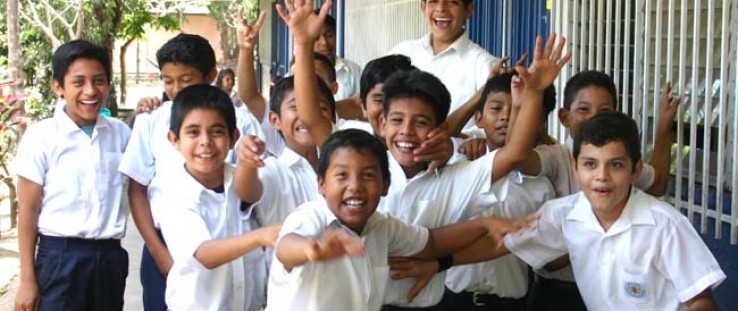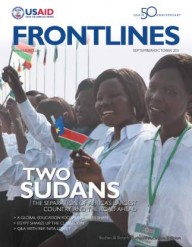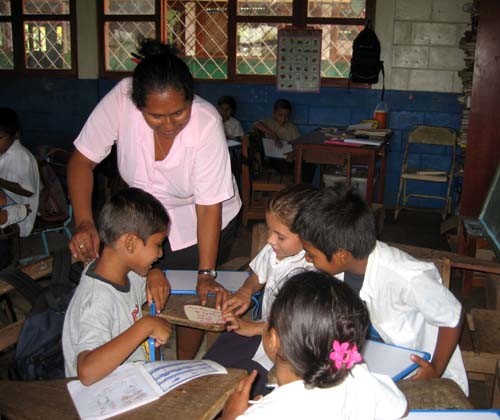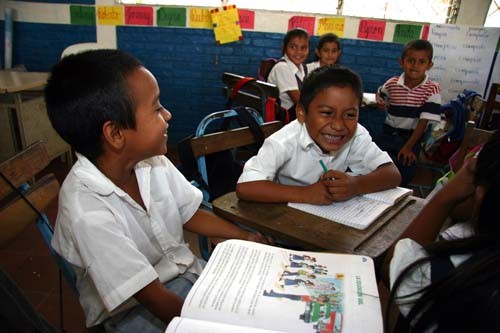 Despite gender equality in access to schooling in Nicaragua, boys have higher drop-out rates than girls. Because of economic reasons, especially in rural areas, the chances of a dropout returning to school are minimal.
USAID
Despite gender equality in access to schooling in Nicaragua, boys have higher drop-out rates than girls. Because of economic reasons, especially in rural areas, the chances of a dropout returning to school are minimal.
USAID
 Despite gender equality in access to schooling in Nicaragua, boys have higher drop-out rates than girls. Because of economic reasons, especially in rural areas, the chances of a dropout returning to school are minimal.
USAID
Despite gender equality in access to schooling in Nicaragua, boys have higher drop-out rates than girls. Because of economic reasons, especially in rural areas, the chances of a dropout returning to school are minimal.
USAID
Eight-year-old Roberto Rodríguez is trying to read a story about Mary’s lost cat. While many of the other kids at his rural school in Nicaragua can easily get through the story and answer questions, Roberto feels like giving up.
The other kids can tell the teacher all about the plot—where the cat was, how they found her, how many kittens she was protecting. Roberto cannot. Unfortunately, Roberto’s reading problems are not unique.
While Nicaragua, along with much of Latin America, has made tremendous gains in getting parents to enroll children in school—for example, primary enrollment increased from 75 percent to 87 percent between 2000 and 2009—keeping them there and assuring they learn remain difficult challenges.
The Central American country loses millions of dollars every year due to grade repetition and drop-outs; recent indicators suggest nearly one-third of all Nicaraguan students either repeat or quit the first grade. Research also indicates that illiteracy is closely correlated with these trends. Almost half of Nicaraguan third-graders scored at the lowest levels—earning a 0 or 1 out of a possible 4—on the most recent UNESCO regional literacy achievement test.
Both USAID and the Government of Nicaragua share a commitment to improving reading outcomes in the early grades of primary school.
“Identifying problems in reading and promoting early grade reading is crucial for further educational development,” said Richard Whelden, the director of USAID’s Office of Education. “And identifying children who have problems in reading and getting them help before they drop out or fail is the best way to ensure academic success and keep them inside the education system.”
As outlined in the new USAID Education Strategy, early grade reading competency is a fundamental building block for retention of students and success in future grades. This is critical for children from poor communities where basic reading skills may be particularly lacking.
According to the strategy, “Early grade reading competency is critical for continued retention and success in future grades…. Children who do not attain reading skills at the primary level are on a lifetime trajectory of limited educational progress and therefore limited economic and developmental opportunity.”
Early Grade Reading Assessment Project
USAID’s Early Grade Reading Assessment (EGRA) project, which ran from 2007 to 2010, supported Nicaraguan efforts to improve the quality of primary education by helping to detect and correct early grade reading problems that could follow students through school and beyond.
EGRA used a simple written and oral test to assess the extent to which young students learn to read. The assessment identified specific reading challenges—from identifying letters of the alphabet to reading and listening comprehension—and indicated remedial work necessary before the end of the school year. This, in turn, made the crucial difference in learning to read at grade level and helped minimize the risk for repetition or dropout.
Vanessa Castro from Centro de Investigación y Acción Educativa Social, or CIASES, a USAID implementer on education projects, explained: “Reading is key in the learning process; it is key as a social tool to communicate with one another; it is key to continue learning and have fun and to understand other classes in school.”
Over the course of the three-year project, almost 7,000 students in second, third, and fourth grades were tested in Spanish in 126 schools throughout the country using the EGRA tool. While it’s not appropriate to directly attribute prevented dropouts to EGRA, the hundreds of Nicaraguans trained in the methodology agree that it provides a critical tool for early identification of children most at risk for falling behind or dropping out.
The Nicaraguan Government also agrees. Throughout the implementation of EGRA, the Nicaragua Ministry of Education worked to integrate its survey tools into its own operations. This included commissioning EGRA-related teacher training workshops and best-practice videos to ensure that primary school teachers used EGRA in the classroom. These tools will help provide an educational safety net to thousands of young Nicaraguan students moving forward.
The Nicaraguan Government has a long tradition of promoting reading improvement at all levels and has recently prioritized early grade reading in its strategic plans and long-term goals, including with its Batalla por el Primer Grado, or Battle for First Grade, a campaign designed to have all children reading at grade level by the end of their first year of primary school.
At the 2010 International All Children Reading by 2015 workshop held in Washington, D.C., the Nicaragua Ministry of Education unveiled plans to make EGRA a part of the national assessment system and to train all first-grade teachers to conduct and use EGRA.
EXCELENCIA Project
Even earlier than EGRA, in 2005, USAID/Nicaragua launched the four-year EXCELENCIA program. The project stressed modern teaching practices, child-centered educational techniques, and community participation to increase student retention and promotion rates at nearly 3,000 schools. At least one school in every municipality in the country, including 100 schools in the underserved, multiethnic autonomous regions on the Atlantic Coast, participated in the project.
Rather than focusing on repetition as a learning base, as is common in many schools in Nicaragua, the EXCELENCIA program used the “Learn, Practice and Apply” method—APA in Spanish, which relies on building students’ competencies through applied learning rather than memorization. On any given day, children in EXCELENCIA schools might be conducting experiments with household goods, learning about the environment by visiting a local river, or improving math skills by simulating market visits.
The project, which worked with over 3,000 grade schools and covered nearly half of grade school students—established a mentoring program whereby schools successfully implementing the program were paired with non-participating schools to assist them in applying the same methodologies.
According to the closing report from the EXCELENCIA Project, data suggest notable gains in cognitive ability amongst children enrolled in EXCELENCIA schools, as well as an increase in primary completion rates compared to national averages: An estimated 62 percent of students in well-established EXCELENCIA mentor schools, who started primary school in 2002, graduated from sixth grade in 2007. This compares with an average of only 40 percent for students in primary schools nationwide.
Building on USAID Projects
The private sector is also helping convert children to early and successful readers. In December 2009, several private companies kicked off the reading campaign Todos a Leer, or “Everyone, Let’s Read.”
Inspired by EGRA, the campaign developed reading contests for first graders and awarded prizes to students and teachers who met certain reading benchmarks. A second campaign in 2011 attracted participation from six NGOs and private companies, including Save the Children and communications giant Telefonica.
USAID is currently working with 190 Nicaraguan schools through its 2010 Alliances 2 project, with plans to expand that figure to 350 by engaging the private sector. The project aims to expand access to quality education and health services—including work in nutrition, maternal and child health, and HIV/AIDS—by leveraging private investment, and will focus on increasing reading with fluency and comprehension.
“USAID/Nicaragua, through its innovative and targeted education projects, has laid the groundwork for students’ successful schooling careers,” said Kirk Dahlgren, acting mission director. “The challenge ahead is to ensure that the knowledge and skills gained by teachers and administrators in the EGRA and EXCELENCIA projects continues to benefit the children of Nicaragua.”
That could mean students like Roberto Rodríguez will have a better chance of catching up to their better-read classmates, giving them an early start on a lifetime of reading, learning, and preparing them to contribute to the global economy.











Comment
Make a general inquiry or suggest an improvement.